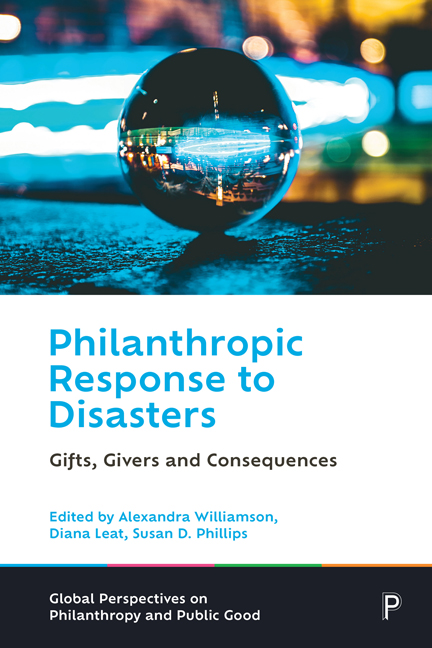Book contents
- Frontmatter
- Contents
- List of tables and figures
- Notes on contributors
- Series editors’ preface
- 1 Introduction
- 2 The public’s philanthropic response to disaster: plus ça change?
- 3 Disaster fundraising: readiness matters
- 4 Roles of philanthropic foundations as funders and distribution agents in disaster response
- 5 The private sector and disasters: from reactive response to disaster resilience
- 6 Fundraising, grantmaking and regulatory issues: regulating good in bad times
- 7 Doing good better: public policy for disaster philanthropy
- 8 Philanthropy’s place in community-based capacity development for disaster resilience
- 9 Nonprofit collaboration and coordination in disaster response: lessons from the 11 September recovery
- 10 The promise and reality of philanthropy in disasters
- 11 Conclusions and looking forward
- Index
11 - Conclusions and looking forward
Published online by Cambridge University Press: 17 January 2024
- Frontmatter
- Contents
- List of tables and figures
- Notes on contributors
- Series editors’ preface
- 1 Introduction
- 2 The public’s philanthropic response to disaster: plus ça change?
- 3 Disaster fundraising: readiness matters
- 4 Roles of philanthropic foundations as funders and distribution agents in disaster response
- 5 The private sector and disasters: from reactive response to disaster resilience
- 6 Fundraising, grantmaking and regulatory issues: regulating good in bad times
- 7 Doing good better: public policy for disaster philanthropy
- 8 Philanthropy’s place in community-based capacity development for disaster resilience
- 9 Nonprofit collaboration and coordination in disaster response: lessons from the 11 September recovery
- 10 The promise and reality of philanthropy in disasters
- 11 Conclusions and looking forward
- Index
Summary
As a focus of research and professional practice – distinctive from the study of disaster management or routine philanthropy – disaster philanthropy is still nascent. Guiding theories of giving, distributing and regulating disaster philanthropy are fledgling, if they exist at all. Nevertheless, the preceding chapters reveal some clear recurring themes that can serve as a basis for deeper exploration and theory development, including evolving definitions of key terms, process and governance, the interface of philanthropy and the state, intra- and intersectoral collaboration and coordination, and distribution of resources pre-versus post-disaster. Weaving through these broad themes are common threads of donor expectations, communications and time. This final chapter considers and integrates these themes and threads, suggesting reflections and questions for future research.
Recurring themes
Definitions
A key theme throughout the volume is that of definitions and shared conceptual understandings, which give rise to at least two related issues. The first is how ‘disaster’ is defined. When an event qualifies as a ‘disaster’ is touched on in several chapters. Conway notes that there are 128 definitions of disaster in the literature; Leat highlights changing notions of disaster over time, as well as the public recognition of disaster as a political statement. The chapters use examples of events already categorised and labelled as ‘disasters’ yet there are clearly events that were a disaster for some people but not designated as such.
The second issue is whether we now see more disasters because we generally expect to live in a humanly controlled and controllable world. Disaster is abnormal, extraordinary. However, in the past, disaster may have been accepted as a normal part of life, while today disasters are perceived to be more disruptive and extraordinary because they are not subject to normal human controls. In addition, the 24-hour news cycle brings disasters into our lives with immediacy and direct connection to personal suffering. How strong is the link between definition of an event as a disaster and the nature and scale of the philanthropic response? Scaife discusses the importance of the media in defining and communicating disaster for fundraising purposes and the complexity of this relationship: perhaps counter intuitively, more coverage does not always mean more money raised.
- Type
- Chapter
- Information
- Philanthropic Response to DisastersGifts, Givers and Consequences, pp. 213 - 223Publisher: Bristol University PressPrint publication year: 2023



